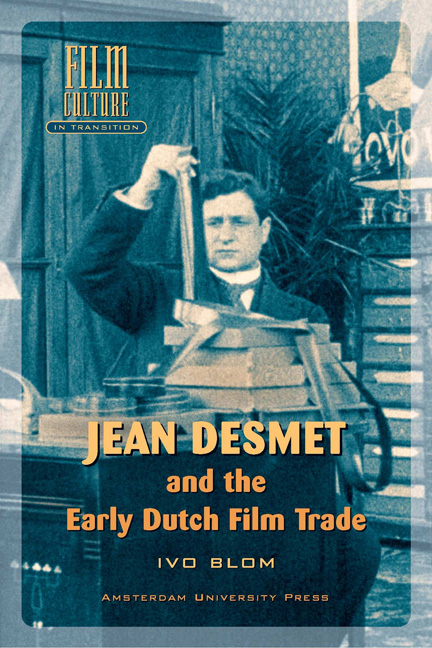Book contents
- Frontmatter
- Dedication
- Contents
- Preface
- Abbreviations, Unidentified Films and Historical Currencies
- Introduction
- I La Comète Belge: Jean Desmet’s Travelling Cinema, The Imperial Bio (1907-1910)
- II In The Beginning…: Film Distribution in the Netherlands Before Desmet
- III Gold Rush: In the Throes of Cinema Mania (1909-1914)
- IV Film Market Europe: Buying Films Abroad (1910-1914)
- V White Slave Girls and German Kultur: Film Rental and Distribution Strategies in the Netherlands (1910-1914)
- VI Onésime et Son Collègue: Competition (1910-1914)
- VII Das Ende vom Lied: The Impact of the First World War (1914-1916)
- VIII Quo Vadis?: Desmet’s Film Rental and Cinema Operation During the Great War (1914-1916)
- IX Afterlife: A New Career and the Beginning of a Collection
- X In Retrospect: Jean Desmet’s Place in Film History
- Notes
- Bibliography
- Photo Credits
- Film Culture in Transition
- Index of Film Titles
- General Index
VI - Onésime et Son Collègue: Competition (1910-1914)
Published online by Cambridge University Press: 14 January 2021
- Frontmatter
- Dedication
- Contents
- Preface
- Abbreviations, Unidentified Films and Historical Currencies
- Introduction
- I La Comète Belge: Jean Desmet’s Travelling Cinema, The Imperial Bio (1907-1910)
- II In The Beginning…: Film Distribution in the Netherlands Before Desmet
- III Gold Rush: In the Throes of Cinema Mania (1909-1914)
- IV Film Market Europe: Buying Films Abroad (1910-1914)
- V White Slave Girls and German Kultur: Film Rental and Distribution Strategies in the Netherlands (1910-1914)
- VI Onésime et Son Collègue: Competition (1910-1914)
- VII Das Ende vom Lied: The Impact of the First World War (1914-1916)
- VIII Quo Vadis?: Desmet’s Film Rental and Cinema Operation During the Great War (1914-1916)
- IX Afterlife: A New Career and the Beginning of a Collection
- X In Retrospect: Jean Desmet’s Place in Film History
- Notes
- Bibliography
- Photo Credits
- Film Culture in Transition
- Index of Film Titles
- General Index
Summary
In 1910, Jean Desmet faced competition from three other large distributors who had all become professionals and who, like himself, owned release cinemas in Amsterdam. Pathé had first claim on their own productions, and after 1910-12, when he was buying his programmes in Germany, Desmet was able to obtain only their newsreels, the Pathé-Journals, which were available on the open market. Nöggerath specialised in Italian epics such as quo vadis? and THE LAST DAYS OF POMPEII but also offered a bit of everything. Gildemeijer became the main importer and distributor of German films and secured exclusive rights on all Asta Nielsen films. Around 1913, they were joined by Wilhelmina, who released German and Italian films. This had the effect of narrowing down the selection of films available to Desmet. Nonetheless, he was now part of the Dutch film distribution establishment. In 1911/12, he made his mark with Danish films and in 1913/14 he brought out long German feature films.
Even before the introduction of exclusive films, Desmet and the other Amsterdam distributors were monopolising the first-week runs of programmes. The first-week system set the pattern for the other less powerful cinema operators who wanted to acquire the films after them. By locating their de luxe theatres in smart shopping streets, and by virtue of their dual function as owners and distributors, Desmet and his associates made the other cinema owners dependent on their little group. They became the trendsetters of Dutch film culture. However, this situation made it difficult for Desmet to increase his profits by releasing his films in other de luxe Amsterdam cinemas, which was one reason why he took over the elegant Cinema De La Monnaie through his NV Middenstad company in 1914.
These cinema operators consolidated their position through the establishment of trade journals, in which they set out their stall as professionals, and drew a line between themselves and those who were merely dabbling in the business by holding sample viewings for potential clients and issuing demands for regulation. Despite this consolidation, owners and distributors competed ruthlessly among themselves. Calls for the regulation of cinemas were also being raised in other quarters, though here the motives were educational, moral, religious and legal.
- Type
- Chapter
- Information
- Jean Desmet and the Early Dutch Film Trade , pp. 217 - 242Publisher: Amsterdam University PressPrint publication year: 2003



